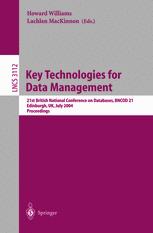

Most ebook files are in PDF format, so you can easily read them using various software such as Foxit Reader or directly on the Google Chrome browser.
Some ebook files are released by publishers in other formats such as .awz, .mobi, .epub, .fb2, etc. You may need to install specific software to read these formats on mobile/PC, such as Calibre.
Please read the tutorial at this link: https://ebookbell.com/faq
We offer FREE conversion to the popular formats you request; however, this may take some time. Therefore, right after payment, please email us, and we will try to provide the service as quickly as possible.
For some exceptional file formats or broken links (if any), please refrain from opening any disputes. Instead, email us first, and we will try to assist within a maximum of 6 hours.
EbookBell Team

4.1
80 reviewsThis year marked the coming of age of the British National Conference on Databases with its 21st conference held at Heriot-Watt University, Edinburgh, in July 2004. To mark the occasion the general theme of the conference was “When Data Is Key”, reflecting not only the traditional key awarded on a 21st birthday, but also the ev- growing importance of electronic data management in every aspect of our modern lives. The conference was run as part of DAMMS (Data Analysis, Manipulation, Management and Storage) Week, which included a number of co-located and complementary conferences and workshops, including the 2nd Workshop on Teaching, Learning and Assessment in Databases (TLAD2), the BNCOD BioInformatics Workshop, and the 1st International Conference on the Future of Consumer Insight Developments in Retail Banking. The aim of this co-location was to develop synergies between the teaching, research and commercial communities involved in all aspects of database activities, and to use BNCOD as a focus for future synergies and developments within these communities. Although this is entitled the British National Conference on Databases, BNCOD has always had an international focus, and this year more than most, with the majority of the papers submitted and accepted coming from outwith the UK.